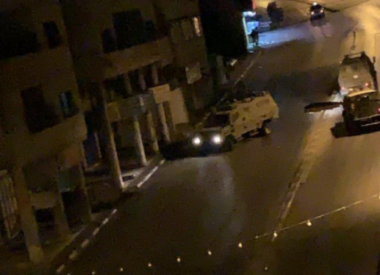Israeli soldiers injured, on Wednesday at night, several Palestinians in the eastern area of Nablus city, in northern West Bank.
Media sources said several army jeeps invaded the eastern area of Nablus, especially around Joseph’s Tomb, and closed it to the Palestinians to allow many buses of colonialist settlers into the area.
They added that the soldiers fired gas bombs at random, including some that directly stuck homes, causing many Palestinians to suffer the effects of tear gas inhalation.
The invasion led to protests, and the soldiers fired more gas bombs, in addition to concussion grenades and rubber-coated steel bullets.
It is worth mentioning that the army frequently invades the eastern area of Nablus to accompany the colonists into the historic site, an issue that leads to protests, in addition to the ongoing invasions of homes and the abduction of many Palestinians.
Joseph the patriarch is revered by Jews, Muslims, Christians, and Samaritans alike, however, the Israeli military allows Jews to visit as part of organized pilgrimages, despite the site being in Area A where the Palestinian Authority theoretically has full control. The Palestinians are not allowed to worship at the site.
Ultra-orthodox and nationalist Jews constantly try to visit the shrine without approval, as many Jews believe the tomb to be the final resting place of the biblical figure in the Old Testament.
Palestinians believe that Joseph’s Tomb is the funerary monument to Sheikh Yousif Dweikat, a local religious figure.
On Wednesday afternoon, the soldiers invaded the western area of Tulkarem city, in northern West Bank.
Furthermore, the soldiers invaded the archeological area in Sebastia Palestinian town, northwest of Nablus, in northern West Bank.
Late on Tuesday night and on Wednesday at dawn, Israeli soldiers abducted twenty-one Palestinians, including children, after the army invaded and searched dozens of homes across the occupied West Bank, including the occupied capital, Jerusalem, in addition to injuring three Palestinians, one seriously, in Tubas, in northeastern West Bank.

